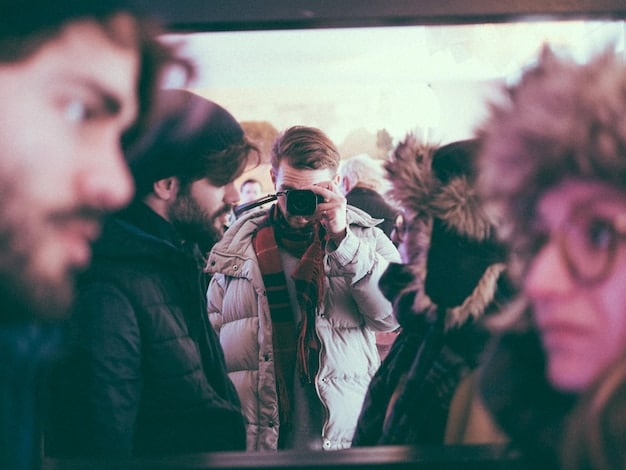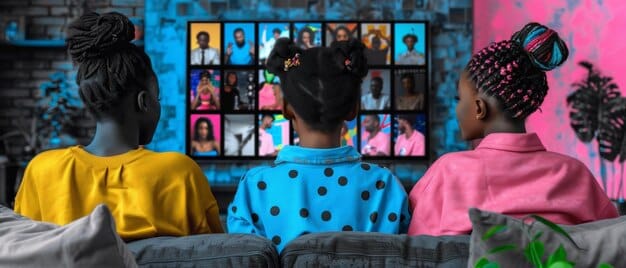Reality TV Scandals: Biggest Controversies (Last 3 Months)

The past three months have been marked by a surge of significant reality TV scandals, unveiling complex issues ranging from ethical breaches in production to legal disputes and public relations nightmares, reshaping audience perceptions and highlighting the industry’s evolving challenges.
In the dynamic and often tumultuous world of unscripted television, the last three months have been anything but quiet. From shocking legal battles to ethical dilemmas behind the scenes, reality TV scandals: the biggest controversies of the last 3 months have dominated headlines, keeping viewers and critics alike on the edge of their seats. These incidents not only entertain but also provoke thought, revealing the intricate layers of fame, manipulation, and public perception inherent in the genre.
The Ethical Tightrope: Production Practices Under Fire
Reality television has long walked a fine line between entertainment and exploitation. The past quarter has seen several shows come under intense scrutiny for their production practices, raising serious questions about the welfare of participants and the moral obligations of producers. These controversies highlight a growing demand for transparency and ethical conduct within the industry, as audiences become increasingly aware of the potential for manipulation and harm.
Participant Welfare and Mental Health Concerns
One of the most pressing concerns revolves around the psychological impact on contestants. Reports have surfaced detailing instances where individuals felt pressured or manipulated into situations that caused significant emotional distress. While waivers are often signed, the full extent of psychological preparation and support provided to participants remains a contentious issue. Critics argue that the pursuit of dramatic narratives can overshadow the well-being of the human subjects involved.
- Inadequate psychological screening before filming begins.
- Lack of consistent, professional mental health support during and after production.
- Pressure to perform specific behaviors or react emotionally for ratings.
- Limited access to external support systems during filming.
Manipulation of Narrative and Editing Practices
Another prevalent issue is the alleged manipulation of storylines through selective editing and staged scenarios. Viewers often question the authenticity of “reality” shows, and recent revelations have only exacerbated these doubts. Producers are accused of crafting narratives that may not accurately reflect events, sometimes at the expense of a participant’s reputation or personal life.
This manipulative approach can distort perceptions, creating villains or heroes where none truly exist, serving the show’s dramatic arc rather than truth. The line between creative storytelling and outright deception becomes blurred, leaving audiences to wonder how much of what they see is genuine. The ethical implications of such practices extend beyond entertainment, touching upon issues of privacy and public trust.
The push for heightened drama and viral moments often leads to questionable editorial decisions. The power dynamics between production teams and participants are inherently unbalanced, with the latter often having little say in how their story is ultimately portrayed. This asymmetry raises concerns about consent and the long-term impact on the participants’ lives once the show airs.
The recent wave of ethical discussions underscores a critical juncture for the reality TV genre. As audiences demand more authenticity and responsibility, production companies face mounting pressure to reassess their practices and prioritize the well-being of their cast members over sensationalism. This shift could lead to a more sustainable and reputable industry, but it requires a fundamental change in approach.
Legal Battles and Contractual Controversies
The world of reality television isn’t just about on-screen drama; it’s frequently entangled in complex legal disputes that extend far beyond the camera’s eye. The last three months have seen a noticeable uptick in lawsuits and contractual disagreements, bringing to light the often-opaque nature of participant agreements and intellectual property rights. These legal battles serve as a stark reminder that behind the glitz and glamour, serious business and personal repercussions can arise.
Breach of Contract and NDAs
One recurring theme in recent legal skirmishes involves allegations of breach of contract and violations of non-disclosure agreements (NDAs). Participants, feeling wronged or exploited, have increasingly challenged the strict terms they signed, sometimes claiming they were not fully informed of the implications. These cases often involve disputes over compensation, post-show restrictions, or unauthorized use of personal stories.
The enforceability of NDAs in the context of emotional distress or alleged misconduct by production companies has become a particularly hot topic. Legal experts are debating whether these agreements can truly silence individuals when serious issues like mental health exploitation or abusive behavior are at play. The outcomes of these cases could set precedents for future productions.
Furthermore, some participants have alleged that productions failed to uphold their end of financial agreements, leading to disputes over lost earnings or promised opportunities. These legal challenges highlight the need for clearer, more equitable contracts that protect the rights and interests of all parties involved, especially the less powerful participants.
Intellectual Property and Idea Theft Claims
Another significant area of contention is intellectual property (IP). Claims of idea theft have emerged, with individuals or smaller production companies alleging that their original concepts were poached by larger entities without proper credit or compensation. These disputes underscore the intense competition within the reality TV landscape, where groundbreaking ideas are highly coveted.
Such IP battles can be long and costly, often involving extensive forensic analysis of concept submissions, pitch meetings, and development timelines. The stakes are high, as the ownership of a successful reality format can translate into millions of dollars in licensing and syndication fees. These cases serve as a cautionary tale for creators to meticulously document their intellectual property from the outset.

A notable case recently involved a former crew member suing a major network, claiming they were instrumental in developing a popular show’s core premise years before it aired. The legal proceedings shed light on the casual handling of ideas in the early development stages, often without formal agreements in place, making it difficult to prove ownership later on.
The increasing frequency of these legal entanglements signals a maturing, albeit still wild, industry. As more money and careers are at stake, all parties are becoming more aggressive in protecting their interests. These legal battles, while often hidden from the public eye, significantly shape the business practices and contractual norms of reality television, pushing for greater accountability and clearer legal frameworks for the future.
Public Relations Nightmares and Reputation Damage
The volatile nature of reality television extends beyond the production set and into the fiercely judgmental arena of public opinion. The last three months have witnessed several high-profile scandals erupt into full-blown public relations nightmares, severely damaging the reputations of individual cast members and, in some cases, entire franchises. The speed at which news travels in the digital age means that missteps, no matter how small, can quickly escalate into widespread condemnation.
Social Media Backlash and Cancel Culture
Social media platforms have become the primary battleground for public outrage. Incidents involving offensive remarks, questionable past actions, or insensitive behavior from reality TV personalities have been met with swift and often brutal backlash. “Cancel culture,” while debated, remains a powerful force, capable of ending careers and brand deals overnight. The lack of a filter between stars and their audience often amplifies these controversies.
- Rapid dissemination of controversial clips or statements online.
- Organized public campaigns to remove individuals from shows or endorsements.
- Difficulty for personalities to control their own narratives once a story goes viral.
- Impact on future career opportunities and public perception.
Sponsor Withdrawal and Network Disassociation
The financial ramifications of public scandals can be immediate and severe. Sponsors, wary of being associated with controversy, often distance themselves from individuals or shows embroiled in PR crises. This withdrawal of financial support can jeopardize the viability of a program and significantly impact a cast member’s livelihood. Networks, too, may take disciplinary action, including suspension or permanent removal, to protect their own brand image.
In a recent example, a long-standing reality show faced a significant sponsor exodus after unearthed problematic social media posts from a lead cast member sparked widespread outrage. The network swiftly issued a statement condemning the behavior, underscoring the delicate balance between audience loyalty and corporate responsibility. The incident served as a stark reminder that even established shows are not immune to public pressure and economic consequences.
The public’s increasing demand for accountability means that reality TV personalities are under constant scrutiny. What might have been brushed under the rug years ago is now amplified, analyzed, and judged by millions. This intense spotlight necessitates a heightened awareness from both individuals and productions about their public image and the potential for any misstep to dramatically alter their trajectory. The quest for authenticity often clashes with the carefully constructed persona, leading to these inevitable public reckonings.
Allegations of Fraud and Misconduct
Beyond the typical on-screen drama, some of the most unsettling recent reality TV controversies have been rooted in serious allegations of fraud and misconduct. These are not merely ethical dilemmas but often involve legal and financial impropriety, threatening the integrity of the shows themselves and the credibility of their participants. Such allegations transcend mere entertainment, delving into the realm of criminal behavior and systemic failures.
Financial Mismanagement and Investment Schemes
A particularly damaging trend involves reality TV personalities being accused of, or even charged with, financial mismanagement or involvement in dubious investment schemes. Leveraging their public platform and perceived success, some figures have allegedly enticed viewers, and even fellow cast members, into ventures that turned out to be fraudulent. The trust audiences place in these personalities can be exploited, leading to significant financial losses for victims.
These cases often involve intricate financial webs, sometimes linked to shell corporations or complex offshore accounts, making them challenging to investigate. The allure of quick riches, coupled with a celebrity endorsement, can blind people to the inherent risks. When these schemes unravel, the legal fallout is severe, often resulting in arrests, asset freezes, and lengthy court battles that tarnish reputations irreversibly.
Sexual Misconduct and Harassment Claims
Perhaps the most disturbing allegations to surface in recent months involve claims of sexual misconduct or harassment on set or within the sphere of a reality show’s influence. These brave disclosures by victims shine a harsh light on potentially abusive environments where power imbalances can be exploited. Such accusations are not only a grave breach of ethical conduct but also represent serious criminal offenses that demand thorough investigation and justice.
These claims often lead to immediate and widespread condemnation, with networks and production companies forced to take swift action, including internal investigations, suspensions, or outright termination of involved parties. The Me Too movement has empowered many to speak out, fundamentally altering the landscape of acceptable behavior in entertainment. The impact extends beyond the individuals involved, pushing the entire industry to confront and rectify systemic issues of exploitation and harassment.
The gravity of fraud and misconduct allegations can irrevocably damage a show’s legacy and a participant’s career, turning public fascination into outright disdain. These incidents underscore the darker side of fame and the immense responsibility that comes with a public platform. As the industry grapples with these severe issues, there’s a growing call for more rigorous background checks, robust reporting mechanisms, and a zero-tolerance policy for any form of exploitation or illegal activity, ensuring the safety and ethical treatment of everyone involved.
Casting Controversies and Diversity Debates
The pursuit of compelling narratives in reality television often intersects with, and sometimes clashes with, societal expectations regarding representation and authentic storytelling. In the last three months, several prominent casting controversies have ignited fervent debates about diversity, inclusion, and the responsibility of networks to accurately reflect the varied fabric of society. These discussions transcend surface-level critique, delving into fundamental questions of fairness and opportunity.
Lack of Representational Diversity
A recurring criticism leveled against certain long-standing reality franchises is their perceived lack of genuine diversity in casting. Despite calls for broader representation, some shows continue to feature predominantly homogenous casts, leading to accusations of being out of touch or intentionally excluding certain demographics. This absence of diverse voices can limit the show’s appeal and perpetuate outdated stereotypes.
Critics argue that true diversity goes beyond mere tokenism, advocating for a genuine commitment to showcasing a wide range of backgrounds, cultures, and perspectives. When shows fail to reflect the diverse audiences they aim to attract, they risk alienating viewers and losing cultural relevance. The pressure for more inclusive casting is mounting, with audiences advocating for substantive change rather than superficial adjustments.
Problematic Cast Member Backgrounds
Adding another layer of complexity, several shows have faced backlash due to discoveries about cast members’ problematic pasts. Whether it’s historical social media posts, controversial affiliations, or previously unreported legal troubles, these revelations often spark public outrage and force networks into damage control. The vetting process for reality TV participants has come under intense scrutiny, with questions raised about its thoroughness and effectiveness.
The dilemma for production companies lies in balancing the desire for provocative personalities with the necessity of maintaining a positive public image. While a certain degree of “drama” is inherent to the genre, audiences draw a line when it comes to endorsing individuals with genuinely disturbing histories. This presents a unique challenge for producers: how to unearth compelling stories without inadvertently platforming problematic individuals whose pasts could severely jeopardize the show’s reputation.

The ongoing debates surrounding casting and diversity reflect a broader societal conversation about who gets to tell their story on a global stage and how authentically those stories are presented. As reality television continues to evolve, its legitimacy and future success will increasingly depend on its ability to embrace genuine inclusivity and responsibly portray a world far more complex and varied than its traditional casting choices have often suggested. This shift is not just about political correctness; it’s about staying relevant and connecting with an audience that increasingly values authenticity and representation.
The Future of Reality TV: Adapting to Scrutiny
The relentless wave of reality TV scandals: the biggest controversies of the last 3 months has undeniably left its mark, prompting industry insiders, audiences, and critics alike to ponder the future of this pervasive genre. As scrutiny intensifies, fundamental questions are emerging about how unscripted television can adapt, evolve, and perhaps even reinvent itself to maintain relevance and audience trust in an increasingly discerning media landscape. The path forward demands introspection, innovation, and a greater commitment to ethical practices.
Increased Transparency and Accountability
One likely outcome of the recent controversies is a push for greater transparency and accountability within production. This could manifest in several ways: more explicit disclaimers about editing, clearer terms for participants, and potentially even independent oversight bodies to ensure ethical conduct. Networks may find it imperative to demonstrate their commitment to participant welfare and narrative integrity, not just for PR purposes, but as a core operational standard.
This increased transparency might also extend to how production decisions are made, particularly concerning the psychological testing and support provided to participants. Public pressure is building for a more formalized and robust system, moving beyond mere compliance with basic standards to comprehensive care. The industry could see the implementation of psychological checks, on-set therapists, and follow-up support as standard practice, reflecting a maturation in its approach to human subjects.
Evolving Audience Expectations
Audiences themselves are becoming more sophisticated and ethically conscious. The days when any drama was good drama might be fading, replaced by a demand for more authentic storytelling and a discernible moral compass from both the shows and their stars. Viewers are increasingly vocal about what they deem acceptable behavior, both on and off-screen, and their collective voice holds significant power in shaping the genre’s trajectory.
This shift in consumer behavior means that shows overtly reliant on exploitation or manipulative tactics may struggle to maintain long-term viewership. Instead, there could be a pivot towards reality formats that celebrate genuine human connection, skill, or transformation, where the drama arises organically rather than being manufactured. The emphasis may move from “train wreck” TV to content that inspires, educates, or genuinely entertains without resorting to harmful practices.
Innovation in Format and Content Creation
The challenges presented by recent scandals could also spur significant innovation in reality TV formats. Producers might explore new ways to create compelling content that is both engaging and ethical. This could include less invasive filming techniques, greater participant agency in their portrayal, or even narrative structures that openly acknowledge the constructed nature of reality television, inviting viewers into a more honest dialogue about the production process.
Furthermore, the industry may diversify its talent pool, bringing in more ethical content creators, consulting with psychologists, and working with diversity and inclusion experts from the conceptual stage. This collaborative approach could lead to fresh ideas and more responsible programming that resonates with modern sensibilities. The longevity of reality TV will depend not just on its ability to entertain, but on its willingness to adapt to cultural shifts and commit to a higher standard of production ethics.
The period of the last three months, marked by a cascade of significant controversies, serves as both a warning and an opportunity for reality television. It’s a critical juncture where the genre can either double down on its worst tendencies or embrace a path of evolution, prioritizing integrity, authenticity, and the well-being of its participants. The choices made now will undoubtedly shape its legacy and define its place in the future of entertainment.
| Key Point | Brief Description |
|---|---|
| 🎭 Ethical Production | Growing concern over participant welfare and manipulative editing practices, leading to calls for transparency. |
| ⚖️ Legal Challenges | Increased lawsuits regarding contracts, NDAs, and intellectual property theft, highlighting industry’s legal vulnerabilities. |
| 💔 PR Nightmares | Social media backlash and sponsor withdrawals due to cast members’ problematic behavior, impacting reputations. |
| 🔮 Future Adaptations | Industry faces pressure to increase transparency, improve vetting, and innovate formats for sustained relevance. |
Frequently Asked Questions About Reality TV Scandals
▼
The most common type of scandal often involves allegations of manipulated narratives and ethical breaches in production. This includes claims that producers stage scenes, heavily edit footage to create specific storylines, or pressure participants into certain behaviors, leading to public questioning of the “reality” aspect of these shows and concerns about participant welfare.
▼
Scandals can severely impact participants’ mental health, public reputation, and future careers. They may face intense public scrutiny, cyberbullying, loss of endorsement deals, and even legal battles. The emotional toll can be significant, as their personal lives are often exposed and distorted for entertainment, affecting their long-term well-being.
▼
Yes, legal consequences can arise, especially in cases involving fraud, breach of contract, or claims of sexual misconduct. Production companies and individual participants may face lawsuits, fines, or even criminal charges, depending on the severity and nature of the allegations. These legal battles can be costly and damage the reputation of all parties involved.
▼
Networks are increasingly responding by issuing public statements, launching internal investigations, and sometimes even removing cast members or canceling shows. There’s a growing pressure from audiences and advertisers for greater transparency, more thorough vetting processes for participants, and improved ethical guidelines to protect the well-being of those on screen.
▼
These scandals are likely to push the industry towards more responsible production practices. There’s a growing demand for authenticity, diversity, and participant welfare, which could lead to new formats, stricter ethical codes, and better support systems for cast members. The genre may evolve to be less reliant on manufactured drama and more focused on genuine storytelling.
Conclusion on Reality TV’s Recent Tumultuous Period
The past three months have served as a stark reminder of the inherent volatility within the reality television industry. From ethical missteps in production to complex legal entanglements and widespread public condemnation, the genre has faced an unprecedented level of scrutiny. These controversies underscore the critical need for greater transparency, accountability, and a renewed commitment to the welfare of participants. As audiences become more discerning and vocal, the future of reality TV will heavily depend on its ability to adapt ethically, embrace genuine diversity, and pivot towards more responsible and authentic storytelling, otherwise risking its long-term appeal and credibility.





